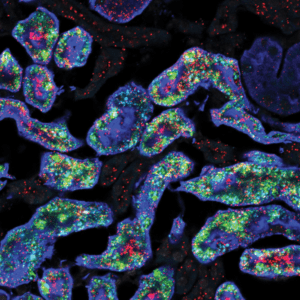USC Stem Cell-led mouse study points to testosterone.
By Cristy Lytal

Two of the genes—Gsta4 in red and Cyp4a14 in green—that are more active in female mouse kidneys (blue) (Image by Jing Liu/McMahon Lab)
Female kidneys are known to be more resilient to disease and injury, but males need not despair. A new USC Stem Cell-led study published in Developmental Cell describes not only how sex hormones drive differences in male and female mouse kidneys, but also how lowering testosterone can “feminize” this organ and improve its resilience.
“By exploring how differences emerge in male and female kidneys during development, we can better understand how to address sex-related health disparities for patients with kidney diseases,” said Professor Andy McMahon, the study’s corresponding author, and the director of the Eli and Edythe Broad Center for Regenerative Medicine and Stem Cell Research at the Keck School of Medicine of USC.
First authors Lingyun “Ivy” Xiong and Jing Liu from the McMahon Lab and their collaborators identified more than 1,000 genes with different levels of activity in male and female mouse kidneys, in a study supported by the National Institutes of Health. The differences were most evident in the section of the kidney’s filtering unit known as the proximal tubule, responsible for reabsorbing most of the nutrients such as glucose and amino acids back into the blood stream. Most of these sex differences in gene activity emerged as the mice entered puberty and became even more pronounced as they reached sexual maturity. (…Read More)